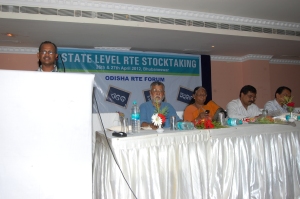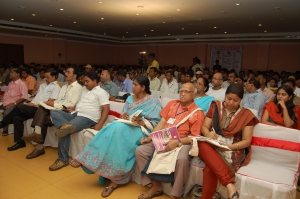Author Archives: odisharteforum
Second Stock Taking Convention
The Odisha RTE Forum(ORF); an umbrella group of all principal education networks and development agencies, civil society organizations, teacher unions and concerned individuals has been trying to build a concerted approach to appraise, track and evaluate efforts related to RTE compliance in the state. As part of this endeavour, the first state level stock taking convention was organized in March 2012 at Bhubaneswar involving all the stake holders and the Department of School and Mass Education, State Commission for protection of Child Right(SCPCR) and such other agencies including leaders from political parties. This year with the completion of the three year bench mark on 31st March 2013, the Forum organized the second stock taking convention on 8th and 9th April 2013 at Hotel Presidency in Bhubaneswar with more than 350 participants from across thirty districts of Odisha representing about hundred plus grassroot organization and gathered on open invitation. They not only participated actively sharing their issues, observation and experiences on the whole gamut of issues pertaining to state of actual implementation of the RCFCE Act at the grassroots but also demanded the legitimate grievances of children from the State through the Forum. The convention ended with agreement on a draft recommendation and some meaningful suggestion from participants as way forward. However the present report is an attempt to reflect all the discussion and deliberation that marked this two day convention and depicts the larger concern surrounding the implementation of the Act in Odisha in terms of the issues and challenges and the way forward.
Recommendations
Community and Children participation:
- Community and children participation needs to be strengthened by building their capacities to demand the realisation of the right of children to education.
- Ensure the membership of children in all SMCs across the state irrespective of membership guidelines given.
- Ensure the formation of second round of SMCs in a participatory and transparent way with PRIs facilitating the election process. SMCs to be recognised as functionaries of decentralised system of education along with the PRIs.
- Revised SDPs to be developed with a bottom up approach and reflected in the district education plan with an adequate allocation of budget.
- The Government should ensure that every school has complete details of parents and SMC members. This should be consolidated at the different levels and made available in the public domain.
Teachers:
- Single teacher schools are to be immediately provided with adequate number of teachers as per the RTE norms.
- Teacher rationalization should be made across the state for even distribution of teachers in the schools as per the PTR norm of the RTE Act.
- Teacher training syllabi should be redesigned keeping in view the recommendations made in the NCF 2005 and RTE Act.
- In-service teacher training programmes should be planned in a way that the teachers get more hours for teaching.
- Capacity of pre service teacher training institutes should be enhanced to meet the huge gap of demand and supply for professionally trained teachers.
- The engagement of teachers in non teaching activities and deployment of teachers on trivial grounds need to be stopped with immediate effect so as to enable them to have more time for class room interactions.
- Provisions for appointing more women teachers needs to be ensured for addressing of the gender specific needs of girl child and similarly tribal teachers from different tribal groups need to be engaged for facilitating learning at the early stage of schooling where language plays a major part in learning.
Inclusion:
- There should be an immediate amendment of the State Rules, to incorporate special provisions of the inclusion of children of excluded and marginalized groups like children with disability,Adivasi, Dalit, Minority and Migrant children.
- Special policy to be developed addressing the diverse needs of children residing in the reserve forest areas, street children, children of parents who are conflict with law, children in civil strife/conflict areas, children with special needs and children affected and infected with HIV/AIDS.
- School infrastructure and other facilities need to created and made functional to meet the needs of children with special needs.
- Zero tolerance approach to any form of exclusion and discrimination in the schools. Community awareness on the issues of inclusion and the grievance redress mechanism to be readily available in case of violations.
- Teachers and government functionaries to be trained on dealing with cases of exclusion with a historical and sociological perspective.
Governance:
- Panchayat Raj Institutions across the State should be designated as Local Authority as stipulated in the RCFCE Act.
- With the wide range of diversities existing in all spheres in Odisha, context-sensitive designing of syllabus and text books needs to be ensured. Further, this should be accompanied by decentralization of syllabus and educational administration to ensure easy school access for each and every category of children.
- It is imperative that the State Advisory Council, as stipulated in the Act and the Rules, be constituted with immediate effect. As per the proposed State Advisory Council, District and Block level Advisory Councils also need to be constituted. NGOs, members from SC and ST communities, and parents of differently-abled children should be mandatory members of the advisory councils.
- State Academic Authority should be supported by an advisory group comprising of persons of eminence from the field of pedagogy and educational management.
Grievance redress system:
- The SCPCR should take suo moto cognizance of cases of violation of child rights. The cases pending with SCPCR should be immediately resolved and adequate follow up action should be taken up.
- A clear system of grievance redress should be evolved at the State level (SCPCR) with the same percolating down to the panchayat and SMC level.
- The mechanisms for redress of teachers’ grievances need to be made more accessible and efficient as per the RTE Act.
- A special designated cell on RTE be opened at SCPCR to dispose cases related to RTE Act violation in a timely manner.
Other critical emerging issues:
- The Government must ensure teaching in mother tongue at primary level, as per the mandate of the RTE Act and should make necessary provisions including teachers appointment etc in this regard.
- The State should formulate clearly the definition of out of school children. It should re-evaluate and come out with the exact numbers of out of school children with convergence of numbers between different departments of the State.
- Special efforts to be made to mainstream invisible children like children working in brick kiln, stone crusher sites, construction sites etc.
- The Government should appoint special instructors for pre-schools and ensure preschool education is integrated into elementary education.
- The Government should publish the list of private schools being governed by the RCFCE Act and the information of the children given admission under 25% Economically Weaker Sections (EWS) reservation to be available in the public domain.
- The Government should ensure regulation of private schools as there is a moral and social responsibility of these schools towards the education of children from marginalized communities. Also, mechanisms for monitoring the private schools regarding the fulfillment of the provisions of the RCFCE Act should be done.


